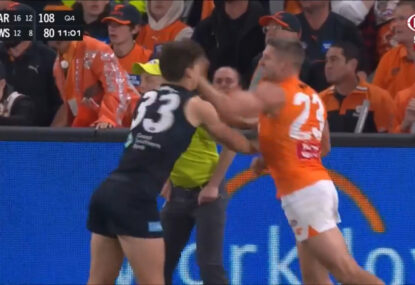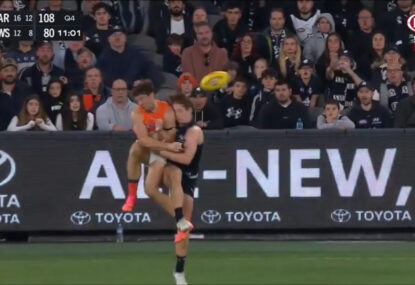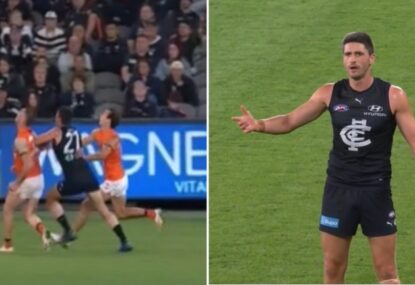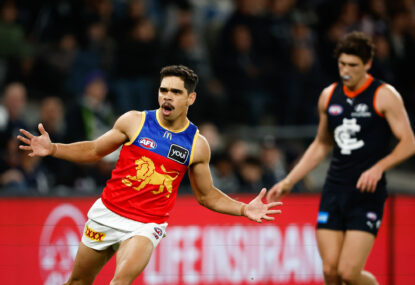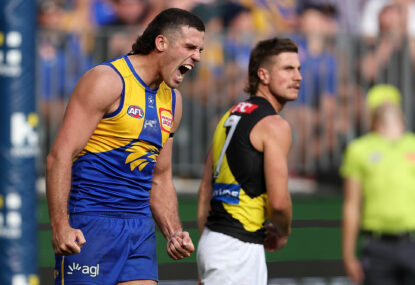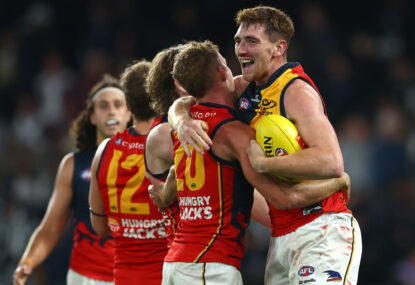Excellence is not always synonymous with excitement. The best at their craft are not necessarily the most electrifying or rousing.
In the AFL, maestros like Sam Mitchell and Scott Pendlebury do inspire their own type of awe, but the excitement you get from watching them is akin to the excitement you get from watching a masterful, really well-directed serious film. Even at 32, Sam Mitchell is ‘No Country for Old Men’.
» FULL STORY: Chris Judd announces retirement from AFL footy
» Judd retires – live blog and updates from his press conference
Following a string of injuries in 2007, Chris Judd had to settle for just being the best, and not the most exciting. After being able to destroy opponents with one swift breathtaking move, he had to go to Simon Black school and learn the art of death by a thousand cuts.
Suffice to say he graduated with first class honours, and after joining Carlton in 2008, Judd became the best inside midfielder in the competition. His shaved head became an unexpected symbol of change – from an explosive highlight reel phenomenon to an imposing, tireless worker.
Statistically, and according to the umpires, Judd’s best season was in 2010. He led the league in contested possessions, getting solid wear out of his copious shoulder strapping in the process as he carried a mediocre Carlton side into the finals.
He was a more rounded player at Carlton than West Coast, significantly increasing his possession and tackle tallies, winning more free kicks with his bruising style of play, and taking on a much greater responsibility in the midfield. Bryce Gibbs and Marc Murphy, it turns out, aren’t Ben Cousins and Daniel Kerr.
In a vacuum, Chris Judd was probably a ‘better’ football player as a #5 in blue. But while excellence is admirable, transcendence is more memorable, and that’s why I’ll always remember Chris Judd as a #3 in the west.
The power of watching a young Chris Judd was that you never knew what he was capable of, and you got the sense that he didn’t know either. Every weekend he was Spiderman the day after getting bitten by that radioactive spider – not entirely sure of the depth of his powers, but excited to test them out. He was so physically superior to the rest of the competition that he made impossibility seem routine.
Height is what really made Judd so visually breathtaking. It just seemed unreasonable that a human being could be that strong and that fast, but also that long and lean. Seeing him accelerate was like watching an impossibly compact gazelle.
 Chris Judd (AFL Media)
Chris Judd (AFL Media)
Recency bias will likely have people remembering Judd with a shaved head winning a tap at a stoppage with three opponents already on him, then having the strength to miraculously fight through them and feed a perfect handball to the outside. But it wasn’t always so difficult.
At West Coast, Judd didn’t need to fight through opponents – he just ran straight through them. He accelerated like Cristiano Ronaldo running towards a solarium, with a remarkable agility to side-step opponents and then recapture full speed as though he’d never broken stride.
That’s the Chris Judd I’ll remember. Not the one with the shaved head, but the one who really should have shaved his head.
Judd was magnificent at Carlton, the best player in the league for a stretch. But at the Blues he was human – he just happened to be better than all the other humans. As an Eagle though, he could take flight, and was a superhero in a population of mortals.
It’s ludicrous to call Judd, a two-time Brownlow medallist, Norm Smith medallist, six-time All-Australian, five-time Best and Fairest, and premiership captain, a cautionary tale, but in the abstract he almost is.
He’s a reminder of how fickle athleticism is, and how it can leave you even quicker than he left behind his opponents at stoppages.
From 2003 to 2012, Judd was an elite force, polling 12 Brownlow votes or more ten seasons in a row. But it was only really from 2003 to 2006 that he was at his athletic peak, before groin injuries, wear, tear and the ageing process intervened, blunting his gifts like a clichéd comic book instalment where a villain takes away Superman’s powers.
Those stories inevitably end with Superman putting his cape back on and taking flight again, but the human body isn’t so kind.
It’s taken almost a decade, but we finally have a successor to peak Judd in the field of transcendent athleticism, and cruelly for Victorians he plays out west too.
Over the next decade Nat Fyfe will become a better football player. He’ll hone his skills, perfect his timing and increase his football IQ. But he’ll never be more exciting than he is right now, where the need to preserve his athleticism is secondary to the burning desire to explore its depths.
Where Judd had the acceleration of the Flash, Fyfe is Spiderman patrolling Manhattan, using the air as his playground. His aerial explosiveness is the most breathtaking weekly spectacle in the AFL and we should savour Fyfe now like we savoured peak Judd then.
While excellence is sustainable, transcendence is fleeting, and eventually the leaps and brutal disregard for his body in the contest will take their toll, and Fyfe will have to time his jumps like the rest of us, and not rely on the heavens to pull him skywards. His body will slowly desert him, and he’ll have to hope that he can adjust half as well as his predecessor did.
Ultimately, that will, and should be Judd’s legacy – that he was able to re-invent himself and re-emerge as the game’s pre-eminent player despite not being at his physical peak.
For that reason, if AFL history only remembers two or three names from the early 21st century, Chris Judd will be one of them. His brilliance came in different forms, but whether he was a superhero or a mere mortal didn’t seem to matter, because he was always a champion.





























































































 Chris Judd (AFL Media)
Chris Judd (AFL Media)